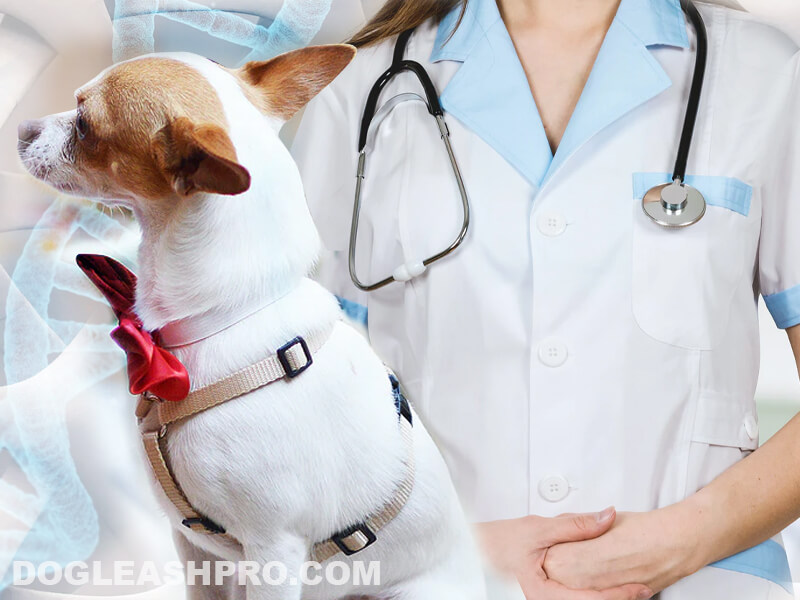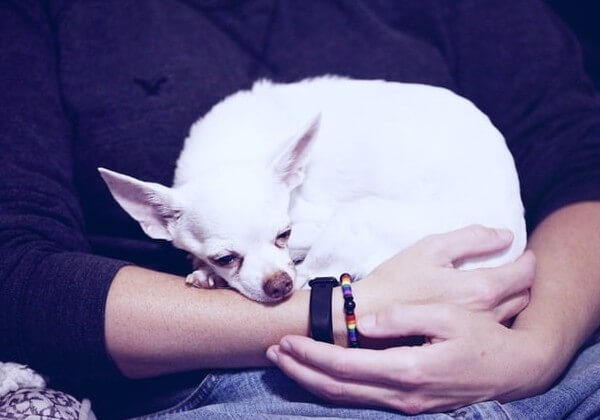
Although Chihuahuas are very small, they have big (and sometimes feisty) personalities. Many Chihuahua owners know how loyal and loving their Chihuahuas are. Since these small dogs are highly protective of their owners, don’t be surprised when they bark and show their small sharp teeth in order to scare strangers away.
However, like other dog breeds, these precious small dogs are susceptible to many Chihuahua health issues including pregnancy complications. Luckily, most of these health problems are treatable so your Chihuahua can go back to living a long, healthy, and happy life.
If you’re a Chihuahua parent or thinking about getting a Chihuahua, we’ve listed the top 13 Chihuahua health issues to be aware of. Let’s get to them now.
Table of Contents
1. Luxating Patella Chihuahua
A luxating patella, or loose kneecap in Chihuahua, causes the knee joint to randomly pop out of its socket. It usually happens due to abnormalities of the leg and thigh bones joints but can also arise after an accident or injury.
Chihuahua Luxating Patella Symptoms:
- Limping.
- Hopping.
- Keeping hind leg raised.
- Misshapen leg.
- Whimpering.
Chihuahua Luxating Patella Diagnosis:
The condition is graded from I to IV:
- Grade I is a rare or occasional dislocation.
- Grade II is a more frequent dislocation.
- Grade III is when the kneecap stays dislocated most of the time.
- Grade IV is a permanent kneecap dislocation.
Treatment for Luxating Patella in Chihuahua
Treatment for grade I and II patellar luxation involves physical therapy, weight management, and medicines to manage pain and inflammation. For grade III and IV patellar luxation, corrective surgery is needed.
2. Chihuahua Hypoglycemia
Toy dogs like Chihuahuas have tiny bodies and can run out of blood sugar suddenly, causing hypoglycemia. It usually happens when the Chihuahua moves a lot and hasn’t had a meal in a while. Some underlying diseases can also lead to hypoglycemia.
Hypoglycemia in Chihuahuas Symptoms:
- Lethargy.
- Dizziness.
- Seizures.
- Weakness.
- Shivering.
- Collapse.
- Loss of appetite.
Hypoglycemia in Chihuahua Diagnosis:
A blood sugar measurement below the optimum level confirms hypoglycemia in a Chihuahua. Additional tests may be run to rule out any other underlying conditions such as organ failure, toxicity, tumors, and thyroid imbalance.
Hypoglycemia Chihuahua Treatment
Initial treatment of hypoglycemia involves giving the Chihuahua a quick dose of sugar. Rub a little honey or corn syrup on the dog’s gums and take them to the vet. If the condition doesn’t stabilize, the vet may administer IV fluids.
3. Chihuahua Tracheal Collapse

The trachea, or windpipe, is supported by cartilage rings that help it stay open during breathing. If some of these rings collapse, the trachea also collapses. This condition is common among Chihuahuas.
Chihuahua Tracheal Collapse Symptoms:
- Difficulty breathing.
- Honking cough.
- Weird breathing sounds.
- Bluish appearance.
- Reduced activity.
Chihuahua Tracheal Collapse Diagnosis:
Although there’s a high chance that the honking cough of your Chihuahua is because of tracheal collapse, the vet may still perform an X-ray and blood tests to confirm a collapse and endoscopy to pinpoint the collapsed area.
Chihuahua Tracheal Collapse Treatment
Treatment can be surgical or non-surgical. Non-surgical treatment involves medications, weight management, steroids, and inhalers. Severe cases require surgical solutions and utilize stents to help the trachea stay open.
4. Reverse Sneezing in Chihuahua
In this condition, the Chihuahua experiences episodes in which it sucks air rapidly through its nose—opposite of how a sneeze works. These episodes hardly last over half a minute.
Reverse Sneezing in Chihuahua Symptoms:
- Honking.
- Gagging.
- Coughing.
Reverse Sneezing in Chihuahua Diagnosis:
Reverse sneezing is no cause for concern, and if you take your Chihuahua to the vet, they’d likely perform tests for kennel cough, tracheal collapse, nasal mites, and allergies. If none of these conditions exist, the dog can go home.
Reverse Sneezing in Chihuahuas Treatment
You can make reverse sneezes go away by gently massaging your Chihuahua’s throat, pulling their tongue, or opening their mouth. If the dog has any allergies, ask your vet for anti-allergy medications.
5. Hydrocephalus Chihuahua
Both deer head Chihuahuas and apple head Chihuahuas are born with a soft spot or opening in their skulls, which usually closes as they grow. But in some cases, that opening doesn’t close completely. The leftover gap can cause a spinal fluid buildup in the skull—a condition called hydrocephalus.
Hydrocephalus Chihuahua Symptoms:
- Seizures.
- Poor coordination.
- Swollen skull.
- Difficulty in routine tasks.
- Circling.
- Cross eyes.
Chihuahua Hydrocephalus Diagnosis:
The vet will perform tests to check for an opening in the head and look for coordination problems in the Chihuahua. After that, an MRI or CT scan will confirm the presence and location of the fluid buildup.
Hydrocephalus Chihuahua Treatment
While the condition is usually fatal, it can be treated if caught early. Medicines include corticosteroids, anti-seizure drugs, and other medications the vet deems necessary. A surgical solution is also present for severe cases.
6. Chihuahua Dental Disease
Chihuahuas are prone to tooth and gum disease. Chihuahuas have tiny mouths and closely-spaced teeth. If their teeth don’t get frequent cleaning, plaque and tartar buildup can damage the tooth, infecting the root, and cause gum diseases.
Chihuahua Gum Disease Symptoms:
- Red or bleeding gums.
- Blood in saliva.
- Chewing from one side of the mouth.
Chihuahua Dental Disease Diagnosis:
The dentist will perform a thorough oral examination and will prescribe treatments for any infections or diseases. X-rays are also effective in checking the extent of infection and the condition of the roots.
Chihuahua Dental Disease Treatment
Antibacterial and antiseptic medications deal with any infection or gum disease, whereas anti-inflammatory medicines will keep pain and swelling under control. Surgery is needed to eliminate the infection underneath the gums. In severe cases, the tooth may need removal.
Fun Fact: Oral hygiene is very important in our small Chihuahuas. Chihuahuas need teeth to eat (and sometimes nibble at a stranger’s heel). Find out the bite force of a Chihuahua in our article, Chihuahua Bite Force PSI.
7. Obesity in Chihuahua
Feeding Chihuahuas over their daily caloric requirement will induce obesity. Unnecessary weight gain gives rise to a slew of other diseases and shortens a dog’s lifespan.
Symptoms of Obesity in Chihuahua:
- Bloated appearance.
- Above-average weight.
- Lethargy.
- Trouble breathing.
Obesity in Chihuahua Diagnosis:
The Chihuahua’s weight is compared to the standard weight for its age and height. If found overweight, the vet may run additional tests to rule out any other underlying condition.
Obese Chihuahua Treatment
The vet would prescribe an exercise and diet program. Obese Chihuahua dogs are usually put on a diet low in fats and high in proteins. They also need a physical routine that burns more calories than it consumes.
8. Chihuahua Bladder Stones
This condition is common among old male Chihuahuas due to their narrow urethras. Bladder stones are very tiny sharp mineral crystals that get lodged in the urinary tract. They can lead to intense pain, trouble urinating, and a urinary tract infection.
Chihuahua Bladder Stones Symptoms:
- Pain when urinating.
- Loss of bladder control.
- Discolored urine.
- Urinating frequently in small amounts.
Chihuahua Bladder Stones Diagnosis:
A urine sample is checked under a microscope for any mineral residue. An ultrasound further confirms the situation and helps locate the stone.
Chihuahua Bladder Stones Treatment
If the blockage is minor, special medicines and dietary supplements can help dissolve the stone. Vets often use ultrasonic shockwaves to break larger stones into smaller pieces to be expelled with urine.
9. Chihuahua Kidney Stones
Kidney stones are similar to bladder stones in shape, composition, and subsequent symptoms. Most bladder stones are kidney stones that got passed down the line and got stuck in the urinary tract.
Chihuahua Kidney Stones Symptoms:
- Loss of bladder control.
- Pain when urinating.
- Urinating frequently in small amounts.
- Discolored urine.
- Abdominal pain.
Chihuahua Kidney Stones Diagnosis:
As with bladder stones, a urine analysis will tell of the stone’s existence and composition, and an ultrasound will pinpoint its location.
Chihuahua Kidney Stones Treatment
Treatment for kidney stones is the same as bladder stones. Depending on the stone’s material, the medicines may be different. However, the goal of any treatment is to break down the stone to be expelled through urine.
Handy Hint: You’ll know that your small pooch is in pain from either bladder stones or kidney stones if your Chihuahua is constantly crying or whimpering whenever he or she is peeing.
10. Necrotizing Meningoencephalitis
Necrotizing Meningoencephalitis (NME) is an inflammation of a Chihuahua’s central nervous system. The condition is incurable and unfortunately often warrants euthanasia.
Necrotizing Meningoencephalitis Symptoms:
- Circling.
- Blindness.
- Seizures.
- Head tilt.
- Loss of coordination.
Necrotizing Meningoencephalitis Diagnosis:
The vet may prescribe an MRI after taking the Chihuahua’s medical history into account. Several conditions can emulate similar symptoms, and an MRI is the most accurate way to diagnose Necrotizing Meningoencephalitis in Chihuahuas.
Necrotizing Meningoencephalitis Treatment
Unfortunately, this disease has no cure, and most dogs are put to sleep within a few months. While supportive care and treatment can keep some symptoms at bay, the prognosis is poor.
11. Spinal Injuries in Chihuahuas
Spinal injuries can result from roughhousing, trauma, a fall, or improper handling. Chihuahuas, especially Blue Chihuahuas, are delicate dogs and need extra careful handling. They are also known to not get along with bigger dogs because Chihuahuas aren’t aware of their small size.
Spinal Injuries in Chihuahuas Symptoms:
- Change in gait.
- Whimpering and yelping.
- Crooked back.
- Pain when touched.
Spinal Cord Injury Diagnosis:
Injuries to the spine are identified via physical exams, and their extent is usually confirmed through X-ray, MRI, and CT scans. The vet may also want to know of any recent injury or accident to rule out genetic conditions.
Spinal Injuries in Chihuahuas Treatment
If the injury is minor, it’s important that you allow your Chihuahua time to rest. Rest and time will heal spinal injuries. Special wheelchairs and splints can help the dog move around without disturbing the spine. Physiotherapy can also help the dog recover. In severe cases, the Chihuahua may require surgery.
12. Pulmonic Stenosis in Chihuahuas
Chihuahuas are genetically predisposed to several heart diseases, one of them being pulmonic stenosis or heart murmurs. It occurs when the Chihuahua’s pulmonic valve is deformed, obstructing blood flow to the lungs.
Pulmonic Stenosis Chihuahua Symptoms:
- Fatigue.
- Lack of stamina.
- Rapid breathing.
- Avoiding exercise.
- Collapse.
Pulmonic Stenosis Chihuahuas Diagnosis:
Since Chihuahuas suffer from multiple heart diseases, diagnosis for pulmonic stenosis can’t be made by a stethoscope. The condition requires an ECG exam and an ultrasound of the heart.
Pulmonic Stenosis in Chihuahuas Treatment
While there is no permanent cure for the conditions, medicines can somewhat alleviate the symptoms. A surgical solution involves artificially opening the blood pathway to the lungs through a balloon-like material.
13. Scleritis in Chihuahuas
Several reasons, including parasites, may cause Scleritis. It leads to inflammation of the white part of the eye that spreads over the whole eyeball, rendering it useless. Chihuahuas have big protruding eyes, making them an easy target.
Scleritis Symptoms:
- Swelling of the eyes.
- Reddening of the eyes.
- Liquid oozing from the eye.
Scleritis Diagnosis:
Scleritis shares several symptoms with other eye diseases, which is why the vet will conduct a thorough eye exam. They will also perform tests to rule out any other infections and take the dog’s medical history into account. In some cases, they do a biopsy.
Treatment for Scleritis in Chihuahuas
If the infection hasn’t spread too far, Scleritis may be treated using steroidal and non-steroidal medications. If the condition is too severe, the Chihuahua may need to have its eye surgically removed.
Chihuahua Health Issues: Common signs and symptoms

Chihuahua ears
An ear infection can sometimes spread to the inner ear, causing vestibular dysfunction. Your Chihuahua’s ears should look clean and crust-free, and there shouldn’t be any redness or foul smell coming from them.
If you have a Chihuahua with floppy ears, pay special attention because floppy-eared Chihuahuas are more prone to ear infections than Chihuahuas with upright ears.
Chihuahua eyes
While Chihuahuas are usually a little teary-eyed, any thick or odd-colored discharge is alarming and needs medical attention.
A Chihuahua’s eyes should be aligned, clear, and shouldn’t have any redness. Crossed eyes mean a neurological issue, whereas odd-colored eyes signal an infection.
Chihuahua nose
A Chihuahua’s nose should be warm to the touch and can be dry or moist. However, excessive nasal discharge and a cold snout can be a cause for concern.
Chihuahua breathing
Your Chihuahua should be able to breathe easily without making weird sounds. Obstructed breathing, honking, coughing, and wheezing can mean respiratory problems.
Your dog’s breath shouldn’t smell foul. Stinky breath is a sign of tooth decay and warrants a dental checkup.
Chihuahua temperature
A Chihuahua’s nominal body temperature is 101°F to 102°F. An elevated temperature is a sign of fever, meaning the Chihuahua’s body is fighting an infection or a nasty microbe. Take your Chihuahua to the vet if it feels warmer than usual.
DISCLAIMER: THIS WEBSITE DOES NOT PROVIDE MEDICAL ADVICE
The information, including but not limited to, text, graphics, images and other material contained on this website are for informational purposes only. No material on this site is intended to be a substitute for professional veterinary advice, diagnosis, or treatment. Always seek the advice of your veterinarian or other qualified health care provider with any questions you may have regarding a medical condition.
Resources:
https://chihuahuaclubofamerica.org/health-committee-mission/
https://en.wikipedia.org/wiki/Chihuahua_(dog)

With over five years of specialized experience as an animal writer, my expertise lies in dog nutrition, health, behavior, grooming, and training. I am dedicated to delivering helpful and informative content that caters to the well-being of our furry friends. My primary goal is to empower pet owners with knowledge and ensure our canine companions thrive in health and happiness. In my free time, I love volunteering at local dog rescue centers.







